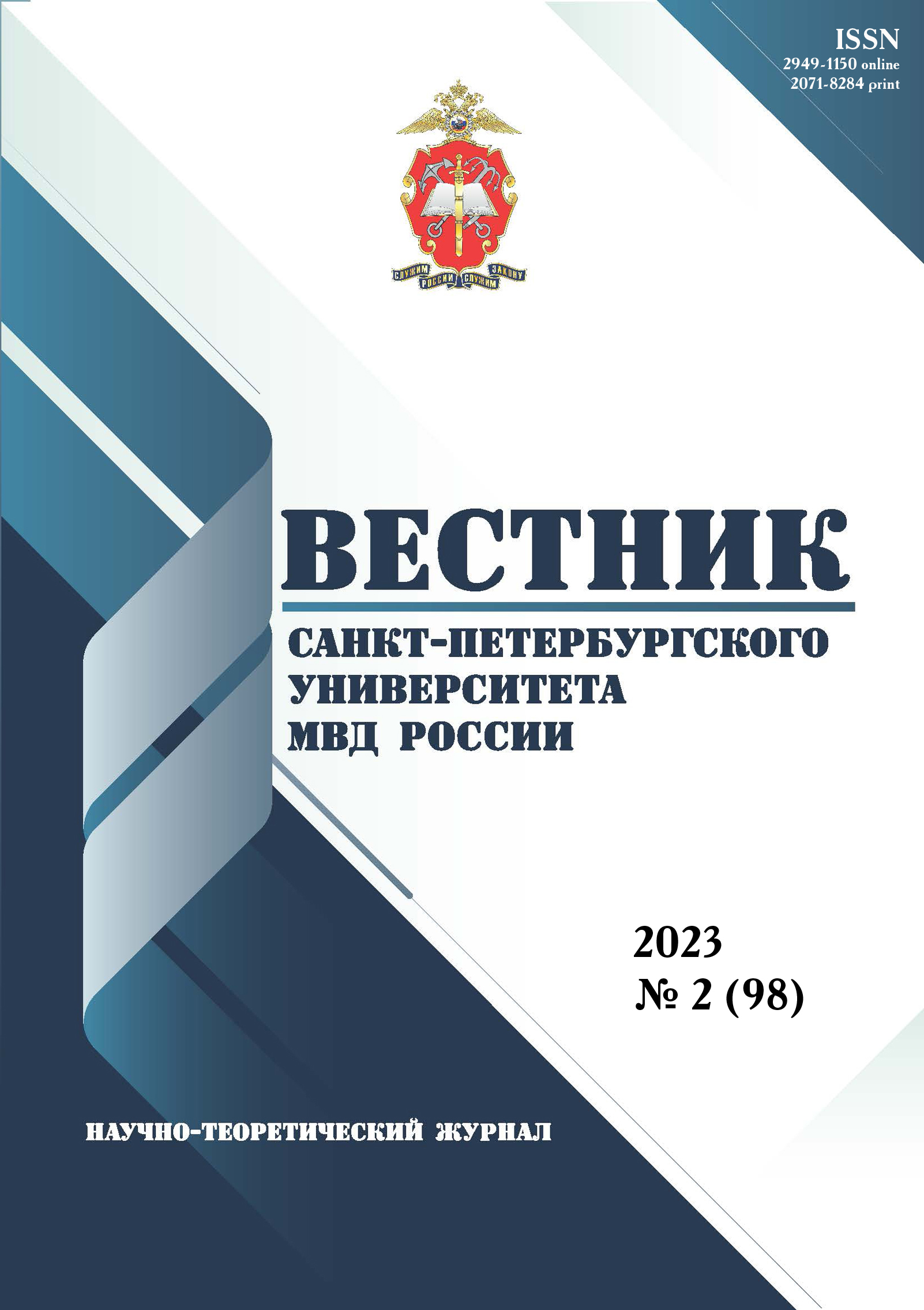Russian Federation
UDC 343.101
Relevance of the research topic and problem statement. Section IV of the Code of Criminal Procedure of the Russian Federation is devoted to measures of procedural coercion. However, coercion in criminal proceedings is not limited to these measures. It is also implemented with the help of other measures, among which are those that have a procedural form (regulated by the Code of Criminal Procedure of the Russian Federation), as well as those that are applied under other legal regimes (under the legislation on administrative offenses, operational-search activities). A number of these measures can be applied at the stage of initiating a criminal case, in contrast to the measures of procedural coercion enshrined in Section IV of the Criminal Procedure Code of the Russian Federation, which is relevant in law enforcement. At the same time, questions about the boundaries and types of coercion at the stage of initiating a criminal case, the legality, effectiveness and expediency of applying a number of such measures remain unresolved. In this regard, the research topic seems to be relevant. Research objectives. The purpose of this study is to analyze the norms of criminal procedure and other sectoral legislation that regulate the behavior of participants in criminal proceedings, to analyze the effectiveness and expediency of coercive measures used in criminal proceedings under various legal regimes. Research methods. Using the comparative legal method of research, the author analyzes coercive measures regulated by various branches of domestic and foreign legislation. With the help of the classification method, coercive measures used in criminal proceedings are grouped. In the course of the survey of practitioners, results were obtained regarding the admissibility of using coercion in the production of a procedural seizure before initiating a criminal case. Research results and rationale for novelty. The results of the study allowed the author to propose a way to improve the effectiveness of verification activities carried out in accordance with Art. 144, 145 of the Criminal Procedure Code of the Russian Federation: the author proposes to expand the list of investigative actions that directly provide the usage of coercion in the course of their production, including those that require judicial authorization. Findings. 1. Coercion is an integral part of all criminal proceedings, therefore, it exists at all its stages, including before the initiation of a criminal case, but it is extremely limited and mostly ineffective. 2. Coercion in domestic criminal proceedings is implemented through a number of non-procedural measures, however, these methods are applied in a heterogeneous manner, and sometimes contrary to the current legislation. 3. The absence of effective coercion at the stage of initiating a criminal case complicates the achievement of the goals of criminal proceedings. 4. The development of effective pre-trial proceedings should follow the path of expanding verification activities at the stage of initiating a criminal case, including those that require judicial authorization.
coercion, criminal proceedings, coercive measures, procedural coercive measures, nonprocedural coercive measures, initiation of a criminal case
1. Rossinskiy S. B. Stadiya vozbuzhdeniya ugolovnogo dela: bezogovorochno uprazdnit' libo popytat'sya ponyat' podlinnye prichiny ee vozniknoveniya? // Aktual'nye problemy rossiyskogo prava. - 2021. - T. 16. - № 6(127). - S. 133-139.
2. Shumilin S. F. Prinuzhdenie kak sostavnaya chast' mehanizma realizacii polnomochiy sledovatelya na proizvodstvo sledstvennyh deystviy // Rossiyskiy sledovatel'. - 2008. - № 11. - S. 4-6.
3. Kudryavceva T. G., Kozhuharik D. N. O dopustimosti v ugolovnom processe ob'yasneniy v kachestve dokazatel'stv // Rossiyskiy sledovatel'. - 2014. - № 5. - S. 28-30.
4. Azarenok N. V. Izmeneniya st. 307 UK RF s pozicii ugolovno-pravovoy i ugolovno-processual'noy pravovoy doktriny // Rossiyskiy sledovatel'. - 2020. - № 8. - S. 33-36.
5. Bagmet A. M., Osmanova N. V. O sovershenstvovanii stadii vozbuzhdeniya ugolovnogo dela // Rossiyskiy sledovatel'. - 2022. - № 2. - S. 8-13.
6. Churkin A. V. Dopustimost' ob'yasneniy kak novyh dokazatel'stv v ugolovnom processe // Rossiyskiy sledovatel'. - 2013. - № 17. - S. 19-22.
7. Rumyanceva M. O. Vozbuzhdenie ugolovnogo dela: problemy i perspektivy : monografiya [Elektronnyy resurs] // SPS «Konsul'tantPlyus» (data obrascheniya 23.11.2022).
8. Lapin E. S. O kachestve proizvodstva obyskov // Problemy ugolovnogo processa, kriminalistiki i sudebnoy ekspertizy. - 2019. - № 1 (13). - S. 28-33.
9. Artemova V. V. Problemnye aspekty realizacii istrebovaniya i iz'yatiya predmetov i dokumentov na etape vozbuzhdeniya ugolovnogo dela // Rossiyskiy sledovatel'. - 2014. - № 3. - S. 3-5.
10. Ryapolova Ya. P. Proizvodstvo sledstvennyh deystviy v hode proverki soobscheniya o prestuplenii: sistemnye protivorechiya ugolovno-processual'nogo zakona // Rossiyskiy sledovatel'. - 2021. - № 5. - S. 21-25.
11. Azarenok N. V. Sovershenstvovanie processual'nogo poryadka predstavleniya predmetov (dokumentov) pri dosledstvennoy proverke soobscheniya o prestuplenii // Ugolovnoe pravo. - 2020. - № 5. - S. 123-126.
12. Rossinskiy S. B. Razmyshleniya ob effektivnosti sudebnogo kontrolya za proizvodstvom sledstvennyh deystviy // Vestnik Tomskogo gosudarstvennogo universiteta. - 2017. - № 423. - S. 225-235.
13. Kozlov V. V. Lichnyy dosmotr kak al'ternativa proizvodstva lichnogo obyska do vozbuzhdeniya ugolovnogo dela // Yurist'-Pravoved'. - 2020. - № 2 (93). - S. 138-142.
14. Lapatnikov M. V. Lichnyy dosmotr v sisteme ugolovno-processual'nyh sredstv dokazyvaniya: problemy teorii i praktiki // Yuridicheskaya nauka i praktika: Vestnik Nizhegorodskoy akademii MVD Rossii. - 2016. - № 2 (34). - S. 439-443.
15. Esina A. S., Makeeva N. V., Borbat A. V. Deyatel'nost' sledovatelya po primeneniyu mery prinuzhdeniya v vide denezhnogo vzyskaniya k uchastnikam ugolovnogo sudoproizvodstva // Rossiyskiy sledovatel'. - 2021.- № 3. - S. 21-25.














